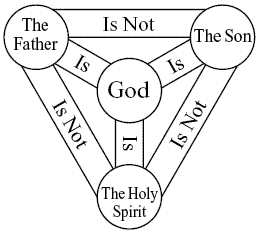David Kelley on How to Evaluate Definitions
How does one objectively evaluate a definition of a concept, e.g. trinitarian or unitarian?
How does one objectively evaluate a definition of a concept, e.g. trinitarian or unitarian?
A new interview for Sam Tideman’s Transfigured podcast about the new 4-way Trinity debate book.
Last time we linked interviews with Dr. Crisp about this book. This time, the knives come out… and also some congratulatory bouquets. This Monday, on the next trinities podcast, I discuss libertarian Calvinism and universalism with Dr. Crisp. If you’ve not studied philosophy, here are introductory-level talks about determinism, libertarian freedom, and compatibilist (aka soft determinist freedom). Both author and reviewers are assuming that you have… Read More »Deviant Calvinism roundup 2 – critics and fans
In his sixth and final installment of the debate, Bowman turns in his finest performance, making a number of interesting moves, and getting some glove on Burke. First, he tweaks his formula (here’s the previous version): The doctrine of the Trinity is biblical if and only if all of the following propositions are biblical teachings: One eternal uncreated being, the LORD God, alone created all… Read More »SCORING THE BURKE – BOWMAN DEBATE – ROUND 6 Part 2 – Bowman
In the 6th and closing round, Burke argues from reason, scripture, and history. From reason: The Trinity doctrine, argues Burke, is inconsistent with itself. The “Athanasian” creed presents us with three, each of whom is a Lord, and yet insists that there is only one Lord. As some philosophers have pointed out, it is self-evident that if every F is a G, then there can’t… Read More »SCORING THE BURKE – BOWMAN DEBATE – ROUND 6 Part 1 – BURKE
 Were there any “biblical unitarians”, or what I call humanitarian unitarians in the early church?
Were there any “biblical unitarians”, or what I call humanitarian unitarians in the early church?
Buckle your seatbelts – this post isn’t a quickie.
First, to review – in this whole debate, Burke has argued that all the NT writers were humanitarians. But if this is so, one would expect there to be a bulk of humanitarian unitarians in the times immediately after the apostles. Here, as we saw last time, Bowman pounces. All the main 2nd century theologians, he urges are confused or near trinitarians. (Last time, I explained that this is a dubious play on the word “trinitarian”. My term for them is non-Arian subordinationists.) There’s not a trace, Bowman urges, of any 1st c. humanitarians – with the exception of some off-base heretical groups, like the Ebionites.
We’re talking about mainly the 100s CE here, going into the first half of the 200s. The general picture, as I see it, is this. Early in the century, we find the “apostolic fathers” basically echoing the Bible, increasingly including the NT (the NT canon was just starting to be settled on during this century). However, some of them seem to accept some kind of pre-existence for Christ (in God’s mind? or as a divine self alongside God?), and they’re often looser, more Hellenized in their use of “god” (so even though as in the NT the Father is the God of the Jews, the creator, Jesus is more frequently than in the NT called “our God” etc.) But clearly – no equally divine triad, no tripersonal God, and in most, no clear assertion of the eternality of the Son. In the second half of the century, starting with Justin Martyr, we find people expounding a kind of subordinationism obviously inspired by Philo of Alexandria, the Jewish Platonic theologian Read More »SCORING THE BURKE – BOWMAN DEBATE – ROUND 5 – BURKE – Part 3
Burke’s fifth round opens some interesting cans of worms. First, he reiterates that the Bible doesn’t explicitly talk of any triple-personed god, but instead calls the God of the Jews the Father. His Son is Jesus, and they stand in a hierarchy as two persons – the Son “under” the Father – over the realm of angels. He says that “Scripture never includes the Holy Spirit… Read More »SCORING THE BURKE – BOWMAN DEBATE – ROUND 5 – BURKE – Part 1
 As I explained in the previous installment, in round 5 Bowman is trying to show that not only does the Bible imply that all three Persons are divine, but also that they in some sense are the one God. In other words, he wants to show how the NT brings the three, as it were, within the being of the one God.
As I explained in the previous installment, in round 5 Bowman is trying to show that not only does the Bible imply that all three Persons are divine, but also that they in some sense are the one God. In other words, he wants to show how the NT brings the three, as it were, within the being of the one God.
To do this, he considers a dozen triadic passages, in which the Three are all mentioned together in quick succession. Last time, I mulled over his treatment of the “Great Commission” passage. This time, a few others, and I take a crack at another explanation of this triadic language.
First, as I look at Bowman’s interpretations, some of them strongly suggest that he thinks that asserting the divinity of each just is asserting each to be numerically identical to God. I looked into this more last time, but briefly, this won’t fly, as it’ll make the persons identical to one another. So it is not clear, even if his expositions are right, that really support an orthodox Trinity theory.
Second, I reiterate that Bowman does a good job here, assembling a dozen important passages, in which it is impossible to ignore the triadic language. Suppose the doctrine of the Trinity is just this vague claim: “there are three co-equal persons in God”. If that is true, that would explain why these three are often mentioned together, in a way which can suggest they are on an equal footing. I said last time that any unitarian is obligated to explain these triadic statements in a way which is both compatible with unitarianism, and which is independently motivated (in can’t be that the only appeal of the reading is that it saves one’s theology).
Here’s Bowman’s treatment of one such text:Read More »SCORING THE BURKE – BOWMAN DEBATE – ROUND 5 – BOWMAN – PART 3
I still mean to comment on Bowman’s 5th round, but my inner logic nerd was drawn in by some action from round 5 here, comment 19: [Burke:] “This week I hope Rob will show Biblical evidence for the essential relationship formulae of Trinitarianism: 1. Father = ‘God’, Son = ‘God’ and Holy Spirit = ‘God’ 2. ‘God’ = Father + Son + Holy Spirit .… Read More »SCORING THE BURKE – BOWMAN DEBATE – ROUND 5 – BOWMAN – PART 2
 In round 5, Bowman aims to show that the “threefoldness” of God is implied by the Bible. At issue is how to explain “triadic” mentions of Father, Son, and Spirit (Or God, Jesus, the Holy Spirit, etc.). Bowman mentions his list of fifty such passages. Here he focuses on a dozen passages. But first, his recap of where he thinks the debate is so far:
In round 5, Bowman aims to show that the “threefoldness” of God is implied by the Bible. At issue is how to explain “triadic” mentions of Father, Son, and Spirit (Or God, Jesus, the Holy Spirit, etc.). Bowman mentions his list of fifty such passages. Here he focuses on a dozen passages. But first, his recap of where he thinks the debate is so far:
In the preceding three rounds of this debate, I have argued that the person of Jesus Christ existed as God prior to the creation of the world and that the Holy Spirit is also a divine person. If my argument up to this point has been successful, I have thoroughly refuted the Biblical Unitarian position and established two key elements of the doctrine of the Trinity. Add to these two points the premises that there is only one God who existed before creation and that the Father is not the Son, the Son is not the Holy Spirit, and the Father is not the Holy Spirit, and the only theological position in the marketplace of ideas that is left is the doctrine of the Trinity. Since these are all premises that Biblical Unitarianism accepts, I have not defended them here. (emphases added)
I’m tired of pointing out the inconsistency of what Bowman is urging. I’m capable of hearing the many ways theorists smooth away apparent inconsistencies (making subtle distinctions), but other than a quick gesture (I think in Round 1), I hear none of these familiar notes from him. This is just to say – he’s a resolute positive mysterian. Briefly, Father, Son and Spirit are numerically three, as they qualitatively differ from one another. But also, Bowman seems to think, each of them is numerically the same as God. This is inconsistent, because the “is” of numerical sameness is transitive – if f = g, and g = s, then f = s (compare: the concept of “bigger than”). Also, it seems that he thinks Father and Son to the same god, and also, since this god just is a person (hence “who” above), they are the same person as each other. And, of course, also they are not. Sigh. Let’s stick with the vague “threefoldness” claim I started with.
Bowman ignores what I call Read More »SCORING THE BURKE – BOWMAN DEBATE – ROUND 5 – BOWMAN – PART 1
 In round 4, Burke urges that his views about God, Jesus, and the Holy Spirit provide a simpler explanation of the texts. Whereas trinitarians must argue from implications of the text,
In round 4, Burke urges that his views about God, Jesus, and the Holy Spirit provide a simpler explanation of the texts. Whereas trinitarians must argue from implications of the text,
By contrast, I argue that the Bible provides us with explicit doctrines about the Father, Son, and Holy Spirit, which… I have shown to be firmly rooted in OT theology.
Burke has a point here, although it can be overstated. Burke’s theology allows him to stick more closely to the words of the NT and the message as preached, e.g. in Acts. Surely, considered by itself this is an advantage. Trinitarians will argue that it is outweighed by the fact that the unitarian message leaves out other essentials, if somewhat implicit ones. Burke complains that Bowman hasn’t defined “implicit“, but this is a general philosophical issue outside the realm of the debate. Burke emphasizes that his approach is “Hebraic” whereas Bowman’s is “Hellenic”. In some sense this may be true, but I don’t think it advances the debate. It is surely possible that God providentially used Greek philosophy to help uncover the true implications of the NT. Further, both debaters are to some extent using Greek-philosophy-originated concepts and logic. Another place in which they’re talking past one another is this issue of the importance of what is and is not explicit in the NT, and specifically in the preaching of the apostles. Bowman is surely right that, e.g. Peter need not assert every element of the apostolic teaching in one sermon, and that Luke’s summary of that sermon surely wouldn’t include all of it. But Burke is right that if it is an essential part of the faith, and necessary to believe for salvation, that e.g. the Holy Spirit is a fully divine person in God distinct from the Father and Son, then we would expect this to be explicitly taught by the apostles, up front, prior to baptism. And we do not find this. But I don’t believe that Bowman has said that one must believe this to be saved. But if he affirms it, and holds that the apostles teach it, then Burke has a strong argument against him. This is surely a pressing, practical question that should be raised.
It is striking that Acts 2 does not contain Read More »SCORING THE BURKE – BOWMAN DEBATE – ROUND 4 PART 3 – BURKE
 In part 1 I argued that Bowman attributes a non-existent fallacy to unitarians. After this faltering start, things get better. Continuing his pre-emptive rebuttal, Bowman argues that there is nothing about the roots of the Hebrew and Greek words translated “spirit” that requires them to mean a force or energy. Surely, this is correct, and his examples show this.
In part 1 I argued that Bowman attributes a non-existent fallacy to unitarians. After this faltering start, things get better. Continuing his pre-emptive rebuttal, Bowman argues that there is nothing about the roots of the Hebrew and Greek words translated “spirit” that requires them to mean a force or energy. Surely, this is correct, and his examples show this.
In the end of his pre-emptive rebuttal, Bowman attributes this argument to unitarians:
I suspect that some current day unitarians do endorse this argument. (Does Burke?) Christians of any stripe who believe in any sort of Hell, in souls, or that the NT more clearly reveals the character of the Father, would probably reject 1. For these sorts of reasons, I reject it myself. In my view progressive revelation is different from the Islamic idea of “abrogation” (later Quranic verses contradicting and cancelling out or over-ruling earlier ones). Progressive revelation doesn’t involve contradiction of something earlier asserted, but rather clarifying something previously unclear, and contradicting things one might have inferred from what was formerly asserted. But back to Bowman.
Bowman opines that the OT unclearly hints at the Spirit being a distinct divine person, but he wants to say that this truth is only first clearly revealed in John 14-16. I think this puts him far off of patristic exegesis, btw – but maybe that’s a good thing.
The real meat of Bowman’s case is his exegesis of the books of John and Acts. His first positive argument is essentially this. Jesus promised that after leaving, he’d send “another Paraclete”Read More »SCORING THE BURKE – BOWMAN DEBATE – ROUND 4 PART 2 – BOWMAN
 In this post I venture to offer some debate advice: be very hesitant to accuse your opponent of a logical fallacy.
In this post I venture to offer some debate advice: be very hesitant to accuse your opponent of a logical fallacy.
In round 4, Burke makes the 3rd error, Bowman the 4th.
Burke argues,
Even Acts 5, where the apostle Peter accuses Ananias of “lying to the Holy Spirit” (verse 3) and his wife of trying to “test the Spirit of the Lord” (verse 9) is not an open and shut case. The usual argument made from this passage is that Peter accuses Ananias of “lying to the Holy Spirit” and Sapphira of trying to “tempt the Holy Spirit”; but since an impersonal power cannot be lied to or tempted, the Holy Spirit must therefore be a person and therefore it follows that the Holy Spirit is God. The logic here is not terribly good, and the argument ends with a non sequitur.
Neither this nor what follows it make clear what Bowman’s errors in reasoning are supposed to be. What exactly is the argument he’s criticizing? Is it this?Read More »SCORING THE BURKE – BOWMAN DEBATE – Round 4 Part 1

“Gee Hank, it sure is swell that communism won out.
This house belongs to all of us!”
In the last post, I pointed out some of the problems faced by an Athanasian sort of derivation view. If you found such problems to be decisive, then alternatively you could opt for a generic view. In this post, I would like to introduce the generic view.
As I mentioned in the first post, the generic view claims that Divinity belongs equally to the three persons, similar to how three people might jointly own the same house. Divinity thus belongs to no one divine person any more than another. The generic view (let’s call this GV) rejects DV in favor of this:
(GV) Divinity belongs equally to each divine person.
For both the derivation and the generic views of the trinity, Divinity is an entity that’s shared by the persons. On (the Athanasian version of) the derivation view, this shared entity just is the Father, but on the generic view, this shared entity is not the Father. The Father isn’t shared, Divinity is.
Read More »Derivation vs. Generic Theories – part 5: The Generic View (JT)

Now Q comes with spring arm action
and dyno bud (optional)!
The Nicene Creed claims that
(Q) The Son is begotten from the substance of the Father.
The term ‘begotten’ is just an older English term for ‘generated’. In the ancient world, ‘generation’ was a technical term for biological reproduction (e.g., when humans make baby humans, when trees make baby trees, and so on). In this post, I want to describe how Athanasius takes Q to imply a derivation view of the trinity.
Read More »Derivation vs. Generic Theories — part 3: The Derivation View (JT)
In “Divine Deception, Identity, and Social Trinitarianism” Dale argues that if Social Trinitarianism (ST) were true, the Father, Son, and Spirit would be guilty of a blameworthy act of deception. But because the Father, Son, and Spirit are ex hypothesi morally perfect, ST must be false. By offering a moral objection to ST, Dale’s argument has the lovely virtue of sidestepping the tired tri-theist objections… Read More »Farewell to Tuggy’s Divine Deception Argument
Tomorrow (Saturday, March 29) at 12:00 EST I’m debating Roman Catholic apologist William Albrecht on whether or not the important early Christian philosopher-theologian Tertullian (d. c. 225) was a trinitarian. Mr. Albrecht is on the affirmative side; I’m on the negative side. He should be well aware of what I’ll argue. I think Tertullian’s language is confusing (to us), and his theology is strange, but… Read More »my online debate: Was Tertullian a trinitarian?
Thanks to reader Mike Gant for his question about my last post. As of now I think I’ve got a solid definition of the concept unitarian: someone who believes that the one God just is (i.e. is numerically identical to) a certain self and not to any other self. But I then tried to define the more specific concept of a Christian unitarian: someone who believes that… Read More »Defining the concept of a Christian unitarian
After my 2004 piece in which I gave three arguments against “social” trinitarianism, I had the privilege of being taken to Hask refuted twice by the excellent veteran Christian philosopher William Hasker. This last summer, I finally got around to replying. I wrote a long piece and sent it to Religious Studies, who had published my original article and one of Hasker’s replies. They generously… Read More »Reply to Hasker re: My Divine Deception Arguments